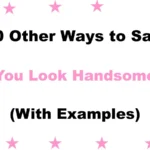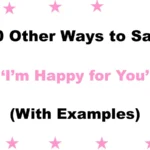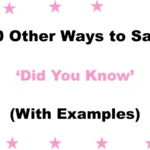Finding the right words to close out an email, meeting, or conversation can leave a lasting impression—especially in professional settings. While “Have a good evening” is polite and widely used, there are many thoughtful alternatives that can add a personal, meaningful touch.
These phrases let you communicate warmth, care, and professionalism while standing out from the standard sign-offs. Whether you’re speaking to a client, colleague, or supervisor, these options help you sound more human and respectful—without being overly familiar or casual.
What Does “Have a Good Evening” Mean?
“Have a good evening” is a friendly, polite phrase used to wish someone well as their day winds down, typically after work hours. It conveys respect, positive intent, and closure in a conversation or message. In professional environments, it is often used in emails, meetings, and casual conversations to end things on a considerate note. It’s neutral, versatile, and widely accepted across industries.
When to Use “Have a Good Evening”
- After Work-Hour Emails or Messages
- At the End of Meetings
- With Clients in Different Time Zones
- When Signing Off the Day
Is It Professional or Polite to Say “Have a Good Evening”?
Yes, “Have a good evening” is both professional and polite. It is a universal, courteous phrase suitable for formal emails, business meetings, and professional conversations. It helps maintain a friendly and respectful tone without sounding overly casual. This makes it a safe and appropriate choice for nearly every work scenario.
Pros or Cons of saying “Have a Good Evening”
Pros:
- Widely accepted in professional communication
- Neutral and respectful for any audience
- Creates a friendly, polite tone
Cons:
- May sound generic or repetitive if overused
- Lacks personalization or emotional warmth in some contexts
- Less impactful when deeper connection is needed
Synonyms for “Have a Good Evening”
- Wishing you a pleasant evening
- Enjoy the rest of your evening
- Hope your evening goes smoothly
- Have a restful evening
- Have a peaceful night ahead
- Relax and recharge tonight
- Have a wonderful rest of the day
- May your evening be enjoyable
- Wishing you a calm and pleasant night
- Take care this evening
- Have a great night ahead
- Rest well tonight
- Enjoy your time this evening
- Have a relaxing end to your day
- Here’s to a quiet and cozy evening
- End your day on a high note
- Hope tonight brings you peace
- Wishing you comfort and rest
- Wishing you a beautiful evening
- Stay safe and enjoy the evening
- Until tomorrow, have a good night
- All the best for the evening
- Wishing you serenity this evening
- Have a lovely evening ahead
- May your evening be stress-free
- See you tomorrow, enjoy tonight
- Take time to unwind
- Hope you end the day well
- Catch you tomorrow—rest easy tonight
- Signing off for now, enjoy your evening
1. Wishing you a pleasant evening
Definition: A formal and warm way to wish someone well in the evening.
Detailed Explanation: This phrase is slightly elevated in tone, perfect for formal emails or messages.
Scenario Example: In a client email: “Thanks again for your time today. Wishing you a pleasant evening.”
Best Use: End-of-day business emails or client communications.
Worst Use: Casual chats where the formality might feel stiff.
Tone: Professional, courteous, respectful.
2. Enjoy the rest of your evening
Definition: A friendly way to encourage someone to make the most of their evening.
Detailed Explanation: Sounds conversational yet polite, perfect for coworkers or clients.
Scenario Example: In a follow-up message: “I’ll get back to you tomorrow. Enjoy the rest of your evening.”
Best Use: Casual work relationships or informal business chats.
Worst Use: Very formal settings with high-ranking professionals.
Tone: Relaxed, warm, approachable.
3. Hope your evening goes smoothly
Definition: Expresses care by wishing someone a calm and stress-free night.
Detailed Explanation: Suggests empathy and awareness of the person’s workload or day.
Scenario Example: After a late meeting: “Thanks for staying late. Hope your evening goes smoothly.”
Best Use: When acknowledging a busy day or evening.
Worst Use: When a formal, emotion-neutral tone is required.
Tone: Supportive, sincere, empathetic.
4. Have a restful evening
Definition: A wish for peace and rest after a long day.
Detailed Explanation: This phrase promotes wellness and downtime, making it thoughtful.
Scenario Example: Wrapping up a project email: “All updates are done. Have a restful evening.”
Best Use: After busy or intense days.
Worst Use: When the relationship is strictly transactional.
Tone: Calm, caring, considerate.
5. Have a peaceful night ahead
Definition: A calming and gentle expression of goodwill for the evening.
Detailed Explanation: Adds emotional warmth while remaining professional.
Scenario Example: In a client message: “That’s everything for today. Have a peaceful night ahead.”
Best Use: With teams, clients, or leaders after stressful meetings.
Worst Use: During upbeat or energetic conversations.
Tone: Gentle, kind, composed.
6. Relax and recharge tonight
Definition: Encourages rest and recovery in a professional, yet human way.
Detailed Explanation: Suggests emotional intelligence while staying work-appropriate.
Scenario Example: After a product launch: “Great work today—relax and recharge tonight.”
Best Use: After high-effort days or projects.
Worst Use: Highly formal exchanges.
Tone: Motivational, appreciative, human.
7. Have a wonderful rest of the day
Definition: Covers both evening and remainder of the workday in one phrase.
Detailed Explanation: A versatile phrase for different time zones or uncertain schedules.
Scenario Example: During remote calls: “That wraps us up. Have a wonderful rest of the day.”
Best Use: In global teams or virtual meetings.
Worst Use: When it’s clearly nighttime in both locations.
Tone: Cheerful, adaptable, positive.
8. May your evening be enjoyable
Definition: A warm, semi-formal way to express goodwill and positivity.
Detailed Explanation: Combines formality with friendliness, perfect for polished messages.
Scenario Example: At the end of a customer support chat: “Thanks for reaching out. May your evening be enjoyable.”
Best Use: Client interactions or public-facing roles.
Worst Use: With internal teams where it may feel too polished.
Tone: Pleasant, refined, kind.
9. Wishing you a calm and pleasant night
Definition: A heartfelt expression promoting tranquility and relaxation.
Detailed Explanation: Sounds nurturing and mature, excellent for people in leadership or mentoring roles.
Scenario Example: To a junior employee: “You handled everything well today. Wishing you a calm and pleasant night.”
Best Use: Mentorship messages or leadership emails.
Worst Use: Casual group chats or Slack messages.
Tone: Nurturing, respectful, graceful.
10. Take care this evening
Definition: A straightforward way to show concern and care.
Detailed Explanation: Slightly more personal, yet still professional and courteous.
Scenario Example: Ending a long back-and-forth email: “Let’s pick this up tomorrow. Take care this evening.”
Best Use: One-on-one communications.
Worst Use: High-level formal messages.
Tone: Thoughtful, genuine, moderately casual.
11. Have a great night ahead
Definition: A positive, forward-looking wish for a good night.
Detailed Explanation: It keeps the tone upbeat and is appropriate in friendly yet professional spaces.
Scenario Example: In a sign-off email: “We’ll finalize tomorrow. Have a great night ahead.”
Best Use: When ending the day with someone you’ve worked closely with.
Worst Use: Ultra-formal business contexts with senior executives.
Tone: Cheerful, motivating, relaxed.
12. Rest well tonight
Definition: A caring phrase encouraging someone to rest and recharge.
Detailed Explanation: More personal in tone but still polite enough for professional settings.
Scenario Example: After a team pulls long hours: “Excellent work today. Rest well tonight.”
Best Use: Post-deadline or during busy project periods.
Worst Use: When the message must remain highly impersonal.
Tone: Warm, empathetic, supportive.
13. Enjoy your time this evening
Definition: A polite and friendly way to wish someone personal joy for their evening.
Detailed Explanation: It suggests balance and well-being without sounding too casual.
Scenario Example: After a status meeting: “That’s all from me. Enjoy your time this evening.”
Best Use: When speaking to colleagues or clients casually but respectfully.
Worst Use: Legal or medical communications.
Tone: Light, human, polite.
14. Have a relaxing end to your day
Definition: A soft, gentle way of suggesting peace and wind-down time.
Detailed Explanation: Implies care and mindfulness, excellent for thoughtful communication.
Scenario Example: After a full day of meetings: “We’re all set. Have a relaxing end to your day.”
Best Use: Email closings after long or stressful work hours.
Worst Use: Extremely time-urgent or high-pressure conversations.
Tone: Calm, soothing, composed.
15. Here’s to a quiet and cozy evening
Definition: A slightly creative yet friendly way to offer evening wishes.
Detailed Explanation: Sounds fresh while still being appropriate for a warm professional tone.
Scenario Example: After a heavy sprint: “You earned it. Here’s to a quiet and cozy evening.”
Best Use: After big efforts or team accomplishments.
Worst Use: In corporate reports or legal communications.
Tone: Inviting, warm, semi-formal.
16. End your day on a high note
Definition: Encourages finishing the day with a positive or celebratory mindset.
Detailed Explanation: It’s more motivational and slightly informal, but still work-friendly.
Scenario Example: In a leadership recap email: “Great collaboration today. End your day on a high note.”
Best Use: Internal teams or peer-level conversations.
Worst Use: Highly formal external client interactions.
Tone: Uplifting, casual-professional, motivational.
17. Hope tonight brings you peace
Definition: A heartfelt way to wish someone emotional calm and rest.
Detailed Explanation: Sounds caring and works well when sincerity is valued.
Scenario Example: To a colleague dealing with stress: “Take care. Hope tonight brings you peace.”
Best Use: When someone’s had a rough or exhausting day.
Worst Use: With people you haven’t built rapport with.
Tone: Compassionate, gentle, sincere.
18. Wishing you comfort and rest
Definition: A nurturing phrase focused on wellness and well-being.
Detailed Explanation: Pairs emotional intelligence with professionalism.
Scenario Example: Wrapping up a support email: “We’ll connect again tomorrow. Wishing you comfort and rest.”
Best Use: Customer service or wellness-oriented business messages.
Worst Use: Highly transactional or legal contexts.
Tone: Thoughtful, warm, emotionally aware.
19. Wishing you a beautiful evening
Definition: A graceful and friendly way to send good evening vibes.
Detailed Explanation: Elegant but simple, ideal for clients or warm business connections.
Scenario Example: After a smooth project handoff: “Everything looks good. Wishing you a beautiful evening.”
Best Use: External communication that benefits from charm and polish.
Worst Use: Tech or finance emails that demand brevity and neutrality.
Tone: Polished, lighthearted, kind.
20. Stay safe and enjoy the evening
Definition: Combines care with friendliness, good for work and public messages.
Detailed Explanation: Includes a practical note of safety which adds humanity to your message.
Scenario Example: Signing off from an event planning call: “Thanks for your time today. Stay safe and enjoy the evening.”
Best Use: Team messages, events, or public-facing updates.
Worst Use: In overly structured or robotic emails.
Tone: Friendly, caring, respectful.
21. Until tomorrow, have a good night
Definition: A warm parting phrase that implies you’ll reconnect soon.
Detailed Explanation: It blends friendliness with an expectation of continued collaboration, keeping the relationship active.
Scenario Example: “That wraps our meeting—until tomorrow, have a good night.”
Best Use: Daily stand-ups or regular check-ins with teammates.
Worst Use: One-off interactions where no follow-up is planned.
Tone: Approachable, optimistic, collegial.
22. All the best for the evening
Definition: A courteous wish that The recipient enjoys their evening.
Detailed Explanation: Slightly more formal than “have a good evening,” it shows respect and genuine care.
Scenario Example: “Thank you for your feedback—all the best for the evening.”
Best Use: Client emails or formal status updates.
Worst Use: Casual internal chats where it feels too polished.
Tone: Polite, respectful, considerate.
23. Wishing you serenity this evening
Definition: A thoughtful phrase focusing on calmness and peace.
Detailed Explanation: Emphasizes emotional well-being, suggesting empathy for possible stress.
Scenario Example: “Project’s complete—wishing you serenity this evening.”
Best Use: After intense work sessions or high-pressure days.
Worst Use: Lighthearted contexts where the tone might feel out of place.
Tone: Gentle, empathetic, soothing.
24. Have a lovely evening ahead
Definition: A gracious and warm expression of goodwill.
Detailed Explanation: Conveys friendliness and a personal touch without losing professionalism.
Scenario Example: “I’ll send the final report shortly—have a lovely evening ahead.”
Best Use: Customer-facing emails or when you want to add charm.
Worst Use: Brief technical updates where brevity is key.
Tone: Warm, charming, sincere.
25. May your evening be stress-free
Definition: A caring wish for relaxation and low stress.
Detailed Explanation: Acknowledges the recipient’s efforts and hopes they find rest afterward.
Scenario Example: “All tasks are complete—may your evening be stress-free.”
Best Use: After tight deadlines or particularly busy days.
Worst Use: Routine messages where stress relief isn’t relevant.
Tone: Supportive, considerate, mindful.
26. See you tomorrow, enjoy tonight
Definition: A friendly sign-off that combines future plans with present goodwill.
Detailed Explanation: Reinforces ongoing teamwork and adds positive closure.
Scenario Example: “Great progress today—see you tomorrow, enjoy tonight.”
Best Use: Teams that meet daily or work in shifts.
Worst Use: One-time meetings without a scheduled follow-up.
Tone: Upbeat, collegial, forward-looking.
27. Take time to unwind
Definition: A direct encouragement to rest and decompress.
Detailed Explanation: Highlights your awareness of work-life balance and their need for downtime.
Scenario Example: “We’ve wrapped the sprint—take time to unwind.”
Best Use: After intense work periods or sprints.
Worst Use: Brief updates or when no stress was implied.
Tone: Caring, considerate, supportive.
28. Hope you end the day well
Definition: A general wish for a positive conclusion to one’s day.
Detailed Explanation: Neutral enough for varied audiences, yet more personal than stock phrases.
Scenario Example: “That’s all for today—hope you end the day well.”
Best Use: Daily emails or routine status reports.
Worst Use: Very formal contexts where phrasing must be standardized.
Tone: Friendly, adaptable, genuine.
29. Catch you tomorrow—rest easy tonight
Definition: A casual yet considerate way to wish for rest before reconvening.
Detailed Explanation: Balances informality with genuine concern, ideal for close-knit teams.
Scenario Example: “Great collaboration—catch you tomorrow—rest easy tonight.”
Best Use: Agile teams, creative groups, or project pods.
Worst Use: Formal client or executive communications.
Tone: Casual, reassuring, collegial.
30. Signing off for now, enjoy your evening
Definition: A clear sign-off combined with a friendly evening wish.
Detailed Explanation: Indicates you’re ending work but still care about their well-being.
Scenario Example: “I’m logging off—signing off for now, enjoy your evening.”
Best Use: End-of-day emails in teams that value openness.
Worst Use: Rigid corporate environments where informal sign-offs aren’t typical.
Tone: Warm, transparent, approachable.
Conclusion
Expressing warm wishes like “Have a Good Evening” professionally can strengthen relationships, show genuine care, and leave a positive impression. Using thoughtful alternatives helps your message stand out, making it feel more personal and meaningful.
Whether you want to sound formal, friendly, or empathetic, the right phrase can convey your intention clearly and respectfully. Choosing expressions with care not only improves communication but also builds trust and rapport in professional settings.
FAQs
1: When is the best time to say “Have a Good Evening” professionally?
The best time is at the end of a workday, meeting, or email conversation when you want to politely close the interaction and wish the recipient well.
2: Can I use informal phrases like “Catch you tomorrow” in professional settings?
It depends on your relationship with the recipient. Informal phrases suit close colleagues or teams but may not be appropriate for clients or executives.
3: How do I choose the right alternative for “Have a Good Evening”?
Consider the context, your relationship with the recipient, and the tone you want to convey—whether formal, warm, empathetic, or casual.
4: Is it okay to use “Have a Lovely Evening Ahead” in business emails?
Yes, it is a polite and friendly phrase appropriate for many professional emails, especially when you want to add a personal touch.
5: What should I avoid when wishing someone a good evening professionally?
Avoid overly casual or ambiguous phrases that may seem unprofessional or insincere, and always match the tone to your audience and situation.






